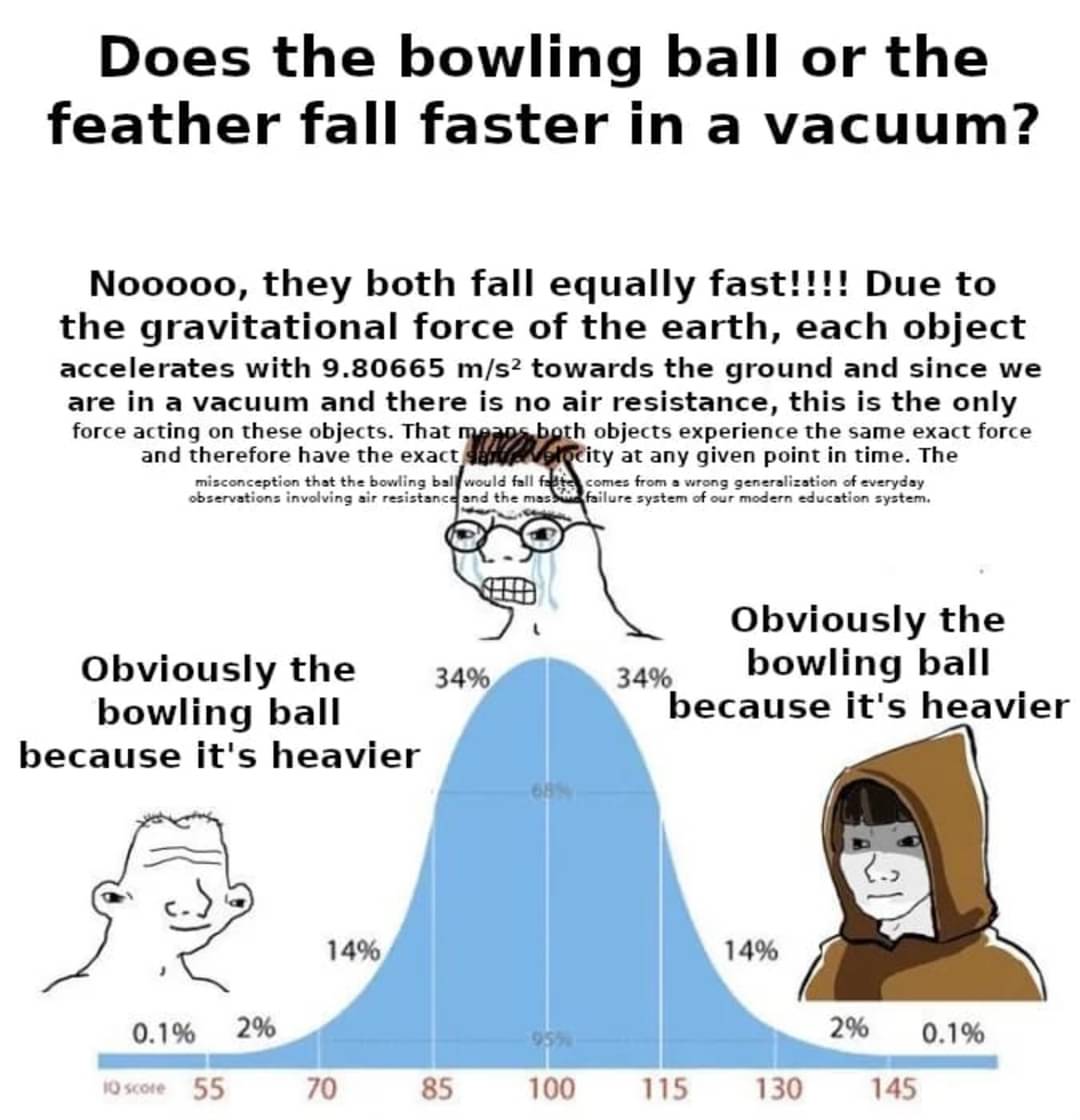this post was submitted on 28 May 2024
216 points (89.4% liked)
Science Memes
11068 readers
2829 users here now
Welcome to c/science_memes @ Mander.xyz!
A place for majestic STEMLORD peacocking, as well as memes about the realities of working in a lab.

Rules
- Don't throw mud. Behave like an intellectual and remember the human.
- Keep it rooted (on topic).
- No spam.
- Infographics welcome, get schooled.
This is a science community. We use the Dawkins definition of meme.
Research Committee
Other Mander Communities
Science and Research
Biology and Life Sciences
- !abiogenesis@mander.xyz
- !animal-behavior@mander.xyz
- !anthropology@mander.xyz
- !arachnology@mander.xyz
- !balconygardening@slrpnk.net
- !biodiversity@mander.xyz
- !biology@mander.xyz
- !biophysics@mander.xyz
- !botany@mander.xyz
- !ecology@mander.xyz
- !entomology@mander.xyz
- !fermentation@mander.xyz
- !herpetology@mander.xyz
- !houseplants@mander.xyz
- !medicine@mander.xyz
- !microscopy@mander.xyz
- !mycology@mander.xyz
- !nudibranchs@mander.xyz
- !nutrition@mander.xyz
- !palaeoecology@mander.xyz
- !palaeontology@mander.xyz
- !photosynthesis@mander.xyz
- !plantid@mander.xyz
- !plants@mander.xyz
- !reptiles and amphibians@mander.xyz
Physical Sciences
- !astronomy@mander.xyz
- !chemistry@mander.xyz
- !earthscience@mander.xyz
- !geography@mander.xyz
- !geospatial@mander.xyz
- !nuclear@mander.xyz
- !physics@mander.xyz
- !quantum-computing@mander.xyz
- !spectroscopy@mander.xyz
Humanities and Social Sciences
Practical and Applied Sciences
- !exercise-and sports-science@mander.xyz
- !gardening@mander.xyz
- !self sufficiency@mander.xyz
- !soilscience@slrpnk.net
- !terrariums@mander.xyz
- !timelapse@mander.xyz
Memes
Miscellaneous
founded 2 years ago
MODERATORS
you are viewing a single comment's thread
view the rest of the comments
view the rest of the comments

This is fascinating! Both of them accelerate toward the earth at the same rate, but because of the bowling ball's greater mass, the EARTH accelerates faster toward the bowling ball than it does toward the feather, so it's imperceptibly faster XD
But they are being dropped at the same time for dramatic effect, so the earth will also be accelerating towards the feather at bowling ball speeds because the feather is next to the bowling ball, therefore they still land at the same time.
That’s only be true if the feather was in the same position as the ball. Otherwise, the earth is moving ever so slightly more towards the ball.
You are forgetting the sun. The earth turns in the direction of sun ever so slightly so if you align the feather next to the ball in the side of the sun, then probably the feather falls faster
So, what you're saying is, to do this experiment correctly, we have to stop the earth from moving. . I'm keen.
🎵 I'll stop the world and melt with you 🎵
No, because the earth is accelerating towards the bowling ball and the feather is next to the bowling ball, the force vector is (ever so slightly) greater towards the bowling ball than the feather, thus the bowling ball drops faster
Yeah I thought about it and I guess I'm wrong. I thought that maybe the ball still wouldn't be faster if there was a perfectly flat surface for both objects to land on, but I imagined how it would be if the bowling ball and feather were actually very far apart, and of course they wouldn't be travelling perpendicular to the platform, and the path of the feather would follow more of a curve. So a slight distance would be the same thing just less.
Can someone explain how the Earth accelerates towards an object? Is this just because objects with mass attract things?
You got it.
Yes. And that force is proportional to acceleration so it accelerates earth
In the same way that earth has gravity that attracts objects, the objects have gravity that attracts earth. See also Newton's third law, also known as "For every action, there is an equal and opposite reaction." - for the earth to attract something, the earth also has to be attracted with the same force. It's just that the earth has a lot more mass, so the force barely accelerates it.
The gravitational force equation actually takes into account the mass of both objects and their distance. The only reason we can throw out a gravitational constant of 9.81m/s^2 for most objects on Earth is because the mass of the Earth is so large that the mass and/or distance of the other object would have to be equally large in order to make any significant change in that value. Technically though, a bowling ball at sea level falls slightly faster than a bowling ball at the top of Everest, as does a bowling ball and feather from the same height. The reason is more accurately that they are experiencing slightly higher or lower gravitational forces, which cause them to accelerate (in conjunction with all the other forces acting on them).
They are being moved, it is just imperceptible to the human eye.
It is all a matter on how precise you want to be
Thank you.